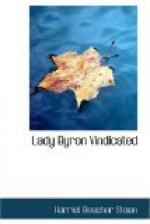In the first place, with our present ideas of propriety and good taste, we should reckon it an indecorum to make the private affairs of a pure and good woman, whose circumstances under any point of view were trying, and who evidently shunned publicity, the subject of public discussion in magazines which were read all over the world.
Lady Byron, as they all knew, had on her hands a most delicate and onerous task, in bringing up an only daughter, necessarily inheriting peculiarities of genius and great sensitiveness; and the many mortifications and embarrassments which such intermeddling with her private matters must have given, certainly should have been considered by men with any pretensions to refinement or good feeling.
But the literati of England allowed her no consideration, no rest, no privacy.
In ‘The Noctes’ of November 1825 there is the record of a free conversation upon Lord and Lady Byron’s affairs, interlarded with exhortations to push the bottle, and remarks on whisky-toddy. Medwin’s ‘Conversations with Lord Byron’ is discussed, which, we are told in a note, appeared a few months after the noble poet’s death.
There is a rather bold and free discussion of Lord Byron’s character—his fondness for gin and water, on which stimulus he wrote ‘Don Juan;’ and James Hogg says pleasantly to Mullion, ’O Mullion! it’s a pity you and Byron could na ha’ been acquaint. There would ha’ been brave sparring to see who could say the wildest and the dreadfullest things; for he had neither fear of man or woman, and would ha’ his joke or jeer, cost what it might.’ And then follows a specimen of one of his jokes with an actress, that, in indecency, certainly justifies the assertion. From the other stories which follow, and the parenthesis that occurs frequently (’Mind your glass, James, a little more!’), it seems evident that the party are progressing in their peculiar kind of civilisation.
It is in this same circle and paper that Lady Byron’s private affairs come up for discussion. The discussion is thus elegantly introduced:—
Hogg.—’Reach me the black bottle. I say, Christopher, what, after all, is your opinion o’ Lord and Leddy Byron’s quarrel? Do you yoursel’ take part with him, or with her? I wad like to hear your real opinion.’
North.—’Oh, dear! Well, Hogg, since you will have it, I think Douglas Kinnard and Hobhouse are bound to tell us whether there be any truth, and how much, in this story about the declaration, signed by Sir Ralph’ [Milbanke].
The note here tells us that this refers to a statement that appeared in ‘Blackwood’ immediately after Byron’s death, to the effect that, previous to the formal separation from his wife, Byron required and obtained from Sir Ralph Milbanke, Lady Byron’s father, a statement to the effect that Lady Byron had no charge of moral delinquency to bring against him. {61}




